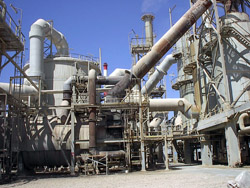

Integrated Pollution Prevention (P2) and Environmental Management System Program – Jordan
Since 2003 under a USAID program, PERI has been introducing enhanced P2 programs to large and small business operations in Jordan. In addition to P2, these programs focus on improving the financial performance and competitiveness of these operations. The overall goal of this effort is to prevent water pollution, to increase water reuse, and to develop and implement model water conservation programs at major industrial facilities that could be duplicated at other facilities in Jordan. The program is the basis for a national industry strategy developed for the Hashemite Kingdom of Jordan to improve industry's water management practices, while at the same time improving overall environmental performance. The program PERI has devised and implemented focuses on retooling industry through P2 and ISO 14001 and demonstrates that good environmental performance through Pollution Prevention means Good Economic Performance.
Because of PERI's efforts a number of programs are now underway to recapture water losses and recycle them. They include:
PERI also provided on site engineering expertise and trained personnel at these facilities on how to conduct P2 audits. This helps to develop in-country expertise to sustain Good Industrial Practices in pollution prevention and water recycling and reuse after PERI personnel leave the country. More than 350 Jordanian industry and regulatory personnel have been trained on Pollution Prevention Programs and Environmental Management Systems. Nearly 4.5 million dollars in pollution prevention opportunities have been identified and/or captured through PERI's efforts.
Integrated Pollution Prevention (P2) and Environmental Management System Program – Romania
PERI personnel assisted in establishing model ISO 14001 programs at more than 10 industrial enterprises and municipal wastewater treatment plants in Romania. PERI personnel efforts focused the USAID funded program on establishing P2 as the centerpiece of the EMSs at each of these enterprises. Our tasks included:
To further demonstrate the benefits of P2 and integrated EMS programs, PERI personnel proposed and implemented a model for national P2 Working Groups. The P2 Working Groups are technical working groups, initially established at 3 municipal wastewater treatment plants, that work in partnership with industry stakeholders to reduce pollution and waste at the source. The first model program achieved 70% reductions in phenols from two major chemical plants to the municipal wastewater treatment facility in the city of Cluj. This saved the facilities more than $150,000 in pollution fees and improved the performance of the wastewater treatment plant.
Litigation Support
PERI provides expert witness services including: investigating and reconstructing events and conditions leading to environmental damages and industrial accidents; rendering expert and qualified opinions on the level and degree of due care practiced at a facility, helping to define liabilities as well as exposures; and assisting in defining the impact of air dispersion and groundwater contamination migrations and public risk. PERI provides expert witness testimony and defends its opinion at deposition and trials. PERI's personnel are experts in environmental forensics. Our team of specialists has helped to reconstruct events, practices and establish waste quantities generated from historical activities at large and small industrial facilities. Using world class specialists from our company, we have established levels of “Responsible Care” both prior to and during the regulatory enforcement era, enabling litigants to understand and for the courts to define appropriate liabilities.
Analysis of the Potential Impact of Reducing NOx Limits to 2.5 PPM
For DOE's Office of Fossil Energy, PERI personnel assessed the impact of achieving ultra-low NOx emissions on market factors, national pollution load, and natural gas turbines employed in the U.S. electric utility industry. The overall objective of the study was to evaluate the impact of further reductions of NOx emission limits, from various stakeholders point of view, on DOE's Advanced Turbine Program (ATS), and to recommend options for consideration by DOE's Office of Fossil Energy in its Interagency Review of proposed EPA standards.
| Back to Practice Areas |

